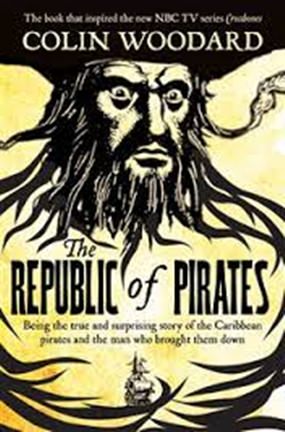Pirates have flourished in our society for thousands of years. From the Pirates of Penzance, to Pirates of the Caribbean to Somali Pirates and now some in the Straits of Malacca, pirates have held a fascination for us all (me included).
So there it was on the Bookazine shelves at The Avenue, beckoning me over, written by Colin Woodard and called The Republic of Pirates (ISBN 978-1-4472-4393-9, Pan Books, 2014). I could not resist it.

Woodard takes the reader back 300 years and shows just why many sailors defected to become pirates, after being denied their wages or were oppressed slaves held in pitiful conditions. Those men were ready to plunder merchant ships, coming into personal fortunes that they could never have earned before (even if they had been paid their wages).
The details of the times Woodard collected from old records and archives, even down to the clothing that was worn in those days.
The book describes the life in London in the early 1700’s where paupers went to a grave that remained open until it was filled. The stench of rotting bodies could be smelled for miles. Chamber pots were emptied out the windows without any thought of who or what was passing by underneath.
“The 18th century essayist Samuel Johnson wrote that the sailor’s lot was very much the same as that of a prisoner, only with the added possibility of drowning.”
Woodard introduces the four main characters, the three pirates Samuel “Black Sam” Bellamy, Edward “Blackbeard” Thatch and Charles Vane. The fourth sailor, Woodes Rogers, was the man set on apprehending the pirates after being sent by the Crown to quell the disturbances in the Bahamas.
The details that Woodard has unearthed are amazing, even such snippets as an Ann Fairfax who was George Washington’s mistress, while at the same time was married to Leonard Washington, George’s brother! It is also interesting that in 1713 book publishing was flourishing, and authors were writing furiously, hoping to be the first out with new tales from the colonies, wars and sea adventures.
It was not just silver and gold that was being transported in the sea-going vessels, but slaves as well. As far as the developed world was concerned, slave trading was just another form of commerce. The conditions were appalling on board ship. Woodard writes, “If smallpox, malaria, dengue fever, measles and dysentery didn’t carry them off, there was also the risk of suicide.”
Whilst the pirates did do well for a while, treasure being divided between captains and crews, the human frailty of wine, women and song would mean that their nest-eggs were soon depleted and they had to find another ship and go out to sea and look for more loot.
The weather was one factor that weakened the pirates, with many of the pirate’s fleet wrecked, until they were no longer the dominant force. What the law could not do, Mother Nature could.
At B. 495, this is not an expensive book, and quite frankly, I found it fascinating. You will too. This is real history depicted by a meticulous historian.




